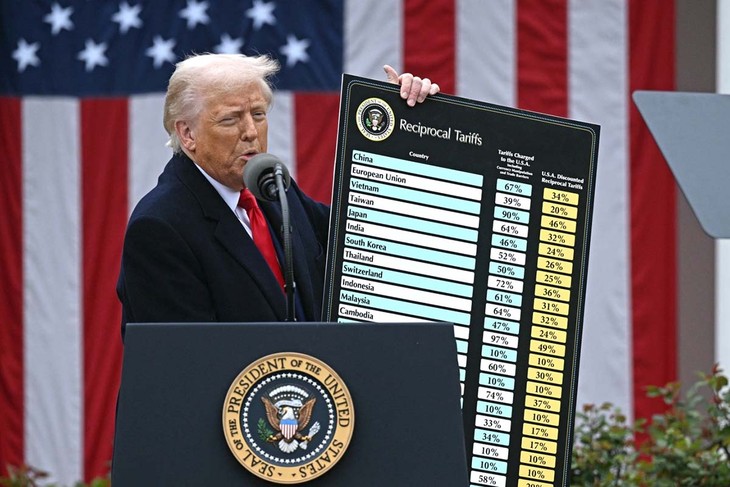(VOVWORLD) - Following US President Donald Trump's announcement on April 2 of a new tariff policy, nations around the world have responded in different ways.
 US President Donald Trump announces the new reciprocal tariffs at the White House on April 2, 2025. (Photo: AFP) US President Donald Trump announces the new reciprocal tariffs at the White House on April 2, 2025. (Photo: AFP) |
Some countries have opted for negotiations to address the issue. Indonesia’s Ministry of Foreign Affairs said it will send a high-level delegation to the US to renegotiate their new 32% tariff.
Meanwhile, China, which faces a reciprocal tariff of 34%, has demanded that the US "immediately cancel" the measure and warned of retaliatory action. Beijing emphasized, however, that communication channels with Washington remain open in the hope of quickly resolving the matter.
South Korea and Japan, facing reciprocal tariffs of 26% and 24%, discussed the impact of the tariffs with US Secretary of State Marco Rubio on the sidelines of the NATO Foreign Ministers' meeting.
EU Trade Commissioner Maros Sefcovic will discuss the tariffs Friday with the US Trade Commissioner. Switzerland, though also affected by a 31% reciprocal tariff, said it has no immediate plans to retaliate, arguing that countermeasures could harm its economy.
Other nations continue to issue statements in response to the US tariff policy. Canadian Prime Minister Mark Carney announced that Canada will take retaliatory measures against the US tariffs by "matching the US approach with 25% tariffs on all vehicles imported from the United States that are not compliant with KUSMA, our North American Free Trade Agreement, and on the non-Canadian content of KUSMA-compliant vehicles from the United States as well."
"Our tariffs, though, unlike the US tariffs, will not affect auto parts because we know the benefits of our integrated production system, and they will also not affect vehicle content from Mexico, which is respecting the KUSMA agreement. Additionally, we are developing a framework for auto producers in Canada to get relief from these counter tariffs as long as they maintain their production and investment in our country. Importantly, every single dollar raised from those counter tariffs—our counter tariffs, which could reach around 8 billion USD before remission—will go directly to our auto workers and the companies affected by those tariffs,” Carney said.